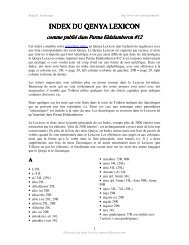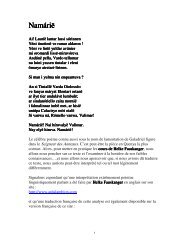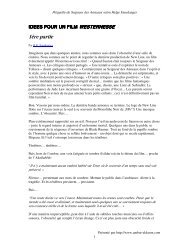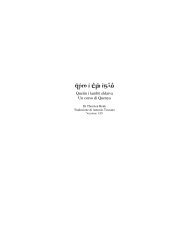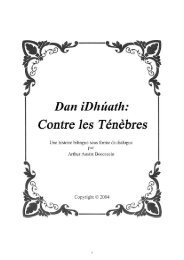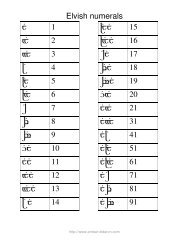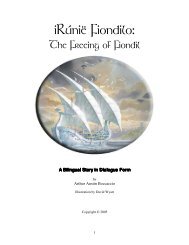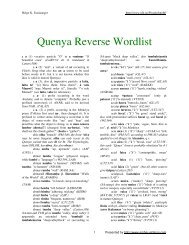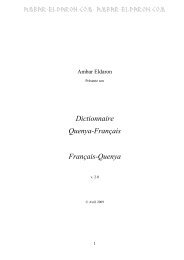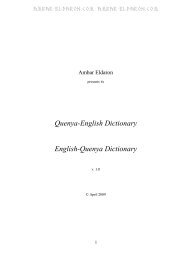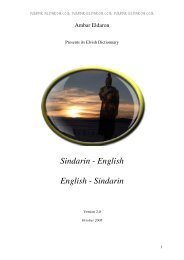English – Quenya - Ambar Eldaron
English – Quenya - Ambar Eldaron
English – Quenya - Ambar Eldaron
You also want an ePaper? Increase the reach of your titles
YUMPU automatically turns print PDFs into web optimized ePapers that Google loves.
Helge K. Fauskanger http://www.uib.no/People/hnohf/<br />
MR:216, 219; VT39:30/VT47:35, MC:223,<br />
LT2:347, VT41:19 cf. 13<br />
BOLD verya, canya; BOLDNESS verië <strong>–</strong><br />
BER, KAN<br />
BOLSTER nirwa (cushion) <strong>–</strong>NID<br />
BOND nútë (knot), vérë (troth, compact,<br />
oath). <strong>–</strong>NUT, WED<br />
BONE axo (pl axor is attested) <strong>–</strong>MC:222,<br />
223<br />
BOOK parma (writings), also attested with<br />
suffixes: parmastanna “upon [-nna] your [-sta,<br />
dual] book”. BOOK LANGUAGE (=<strong>Quenya</strong>)<br />
parmalambë; *BOOK-FAIR #parma-resta<br />
(attested with suffixes: parma-restalyanna<br />
*”upon your book-fair”; see FAIR #2 for further<br />
discussion). <strong>–</strong>PAR/UT:219, 460, LT2:346,<br />
VT49:39, 47<br />
BOON: The wod mána is said to mean<br />
“any good or fortunate thing, a boon or ‘blessing’,<br />
a grace, being esp. used of some<br />
thing/person/event that helps or amends an evil<br />
or difficulty”). Hence the exclamation yé mána<br />
(ma) = “what a blessing, what a good thing!”<br />
(VT49:41)<br />
BORDER réna (edge, margin); ríma<br />
(edge, hem) <strong>–</strong>REG, RĪ<br />
BORN #nóna (isolated from Apanónar,<br />
the "Afterborn") <strong>–</strong>Silm:122/381<br />
BORNE colla (pa.p. of col- "bear") (worn).<br />
Also used as a noun = "vestment, cloak". <strong>–</strong><br />
MR:385<br />
BOSOM palúrë (surface, bosom of earth),<br />
súma (hollow cavity) <strong>–</strong>PAL, MC:223<br />
BOSS OF SHIELD tolmen (isolated round<br />
hill) <strong>–</strong>LT1:269<br />
BOTH yúyo (also prefix yú- "twi-"). Yúyo<br />
is followed by a “singular” or uninflected noun, as<br />
in yúyo má “both hand(s)” <strong>–</strong>YŪ, VT46:23,<br />
VT49:10<br />
BOUND nauta (obliged) <strong>–</strong>NUT<br />
BOTTLE olpë <strong>–</strong>QL:69<br />
BOW (vb) luhta- (Note: a homophone<br />
means "enchant"), #caw- (cited in source as<br />
cawin "I bow", 1st pers. aorist; in Tolkien's later<br />
conception it would be difficult to account for w in<br />
this position, and we should perhaps read *cav-<br />
with pa.t. *canwë); BOW (noun) quinga, cú<br />
(also = crescent Moon), lúva, cúnë (crescent);<br />
RAINBOW helyanwë ("sky-bridge"), Ilweran,<br />
Ilweranta (LT2:348 has iluquinga "sky-bow",<br />
but this word was obsoleted when Tolkien<br />
changed the meaning of ilu from "sky" to<br />
"universe".) BOWLEGGED quingatelco (So it is<br />
translated, but this must really be a noun: "bowleg"<br />
[quinga + telco]. No <strong>Quenya</strong> adjectives end<br />
in <strong>–</strong>o, unless this is the only one. Read<br />
*quingatelca for "bow-legged"? Cf. one of the<br />
other words from the same source, sincahonda,<br />
changed from sincahondo in an earlier draft <strong>–</strong><br />
but at that time Tolkien had already omitted<br />
quingatelco and hence did not change its<br />
ending: See SD:72.) <strong>–</strong>VT47:35, LT1:257, SD 68,<br />
72, KWIG, KU3, LT1:256, LotR:1154, LT1:271<br />
BOWELS, see ENTRAILS<br />
BOWL tolpo, salpa, #salpë (isolated from<br />
tanyasalpë "Bowl of Fire"), fion (goblet <strong>–</strong> but<br />
this word reappears with the unrelated meaning<br />
“hawk” in later material) <strong>–</strong>PE16:142, LT1:292,<br />
253<br />
BOX colca <strong>–</strong>QL:37<br />
BOY: the word seldo, though not clearly<br />
glossed by Tolkien, appears to be the masculine<br />
form of a word for "child". BIG BOY yonyo (son;<br />
this term is also used for "middle finger" or<br />
"middle toe" in children's play). <strong>–</strong>SEL-D-,<br />
VT46:13, VT47:10, 15<br />
BRANCH *olva (PM:340 actually gives<br />
olba, a form that can only occur in the variant of<br />
<strong>Quenya</strong> that uses lb for lv). Etym has olwa, but<br />
probably this should also be *olva according to<br />
the phonology Tolkien used later (notice that the<br />
w of the Etym form is to be derived from older b,<br />
since the root is GÓLOB; later Tolkien<br />
apparently presupposed that older lb becomes<br />
either lv or is preserved as lb in <strong>Quenya</strong>).<br />
TRUNCATED BRANCH, see STUB, STUMP. <strong>–</strong><br />
PM:340, GÓLOB<br />
BRAND yulma (Note: a homophone<br />
means "cup".) <strong>–</strong>YUL cf. Nam<br />
BREAD massa ( masta; LIFE-BREAD (=<br />
lembas) coimas (either *coimass- or coimast-,<br />
cf. massa, masta "bread"), BREAD-GIVER<br />
(fem.) massánië (title of the "Lady" or the<br />
highest among the elven-women of any people,<br />
she having the right to keep or give away lembas<br />
bread). <strong>–</strong>VT43:18, MBAS, Silm:406/429, PM:404<br />
BREAK (vb) rac- (past participle rácina<br />
"broken" is attested); BREAK APART terhat-<br />
(pa.t. terhantë); BREAK ASUNDER hat- (pa.t.<br />
hantë) <strong>–</strong> but in earlier material, hat- meant<br />
“fling”, and Tolkien may have restored that<br />
meaning (see FLING). Since the status of hat-<br />
“break asunder” is uncertain, the alternative form<br />
#ascat- (pa.t. ascantë) apparently from the<br />
same root may be preferred. <strong>–</strong>MC:223, SKAT,<br />
SD:310%<br />
BREAST (chest) ambos (ambost-). <strong>–</strong><br />
PE16:82<br />
BREASTPLATE ambassë (hauberk) <strong>–</strong><br />
QL:30<br />
BREATH (noun) hwesta (breeze, puff of<br />
air), foa (puff of breath), súlë (Þ) (spirit) (earlier<br />
Wordlist last updated July 5th, 2008 12 Presented by http://www.ambar-eldaron.com



